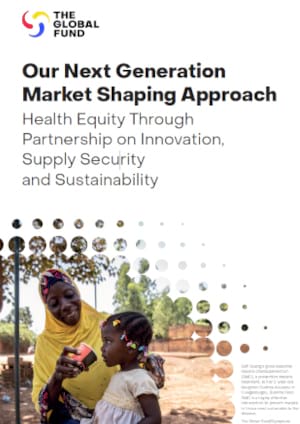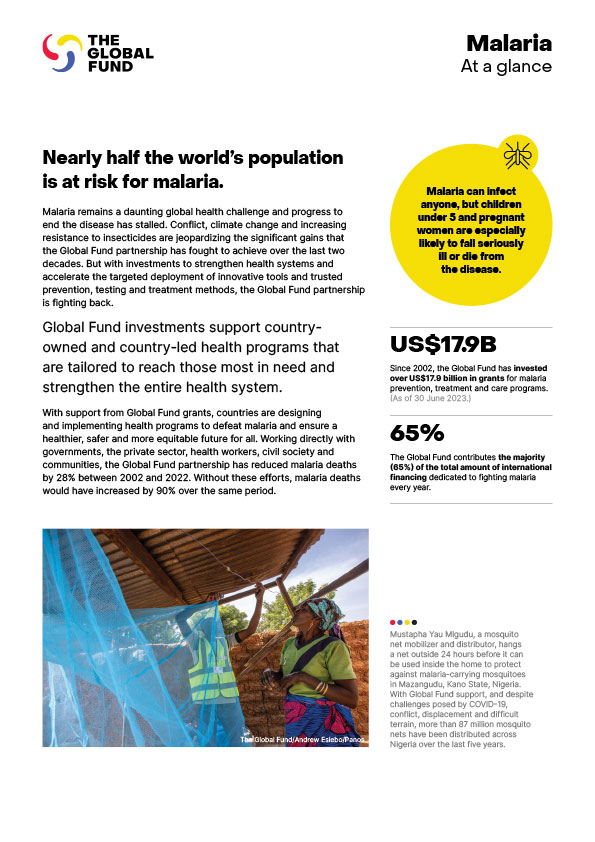China signs new Global Fund HIV and TB grants worth US$ 52 million
02 June 2005
Geneva, June 2, 2005 - China has signed new grants for HIV/AIDS and tuberculosis worth US$ 52 million over the first two years. The total lifetime value of the grants over five years is US$ 120 million.
These grants build on the successes of previous Global Fund grants to China for the three diseases worth US$ 152 million over the lifetime of the programs.
Two of the three grants to China already operational have recently made the successful transition to the second phase of their five-year plan, beyond the initially approved two-year period. Transition is dependent on proof of successful program performance.
The signing of the new Global Fund grants demonstrates the continued commitment of the Chinese government to the fight against these diseases. The grants are being matched by domestic financial commitments from the Chinese government of US$ 611 million over five years to fight HIV/AIDS and US$ 23 million over five years to fight TB.
Tuberculosis grant
The new tuberculosis grant is worth US$ 28 million over the first two years - will:
- promote better collaboration between and referrals from hospitals to TB clinics;
- increase case-detection by increasing awareness and knowledge of TB in the general population. In 2000, 60 percent of China's TB patients did not receive any kind of health education about TB before their diagnosis. To increase awareness of TB, especially among rural populations, village doctors and members of the All China Women's Federation will be trained in TB health promotion approaches and will be provided with health promotion materials to distribute to families in their rural communities;
- reinforce management capacity at central and provincial levels during the rapid DOTS expansion phase.
China has the largest TB program in the world, aiming for universal coverage, primarily implemented through the Government's public health system, but also through village doctors and community-based workers. This new grant builds on the work of the earlier Global Fund TB grant and seeks to further target TB patients in the poorest and most vulnerable communities in China, focusing on 24 central-western provinces in China. In the 2000 National TB Prevalence Survey (NPS) in China, the prevalence of TB in these provinces was 70 percent higher than in the eastern provinces. The 24 provinces are Anhui, Chongqing, Fujian, Gansu, Guangxi, Guizhou, Hainan, Hebei, Heilongjiang, Henan, Hubei, Hunan, Jiangxi, Jilin, Liaoning, Neimeng, Ningxia, Qinghai, Shaanxi, Shanxi, Sichuan, Tibet, Xinjiang, Yunnan.
HIV/AIDS grant
The new HIV/AIDS Global Fund grant is worth US$ 24 million over the first two years - supports a program complementary and harmonized with the UK Government's Department for International Development (DFID) program. The program especially targets intravenous drug users (IDUs) and commercial sex workers (CSWs) in seven provinces of Yunnan, Xinjiang, Guangxi, Sichuan, Guizhou, Hunan and Jiangxi in south and western China. These areas are home to large populations of ethnic minorities, IDUs and CSWs, and high rates of infection, and in these circumstances outreach brings specific challenges for implementers.
The project scales up or is complementary to existing effective programs in China focusing on these vulnerable groups, synergizing the effective approaches of education, information and communication campaigns, voluntary counseling and testing, methadone maintenance, needle and syringe exchanges, condom use promotion, management of sexually transmitted diseases, and ARV treatment.
By June 2007, expected results from this program will include:
- 58 methadone maintenance clinics established;
- 111 needle exchange sites established;
- 55,000 IDUs will have received prevention services;
- 44,000 CSWs will have received HIV/AIDS outreach services;
- 300,000 people will have received HIV/AIDS counseling and testing services;
- 10,000 people living with the disease will have received ARV combination therapy;
- 20,000 people living with the disease will have received preventive treatment for opportunistic infections; and
- 40 percent of HIV-infected pregnant women will have received a complete course of ARV prophylaxis to reduce the risk of mother-to-child transmission of HIV.
Previous Global Fund grants
Previous Global Fund grants to China are a grant to fight HIV/AIDS, signed in August 2004, worth US$ 32 million over first two years; a grant to fight malaria, signed January 2003, worth US$ 6.4 million over five years and now approved in its second three-year phase; a grant to fight TB, signed January 2003, worth US$ 48 million over five years also now approved in its second three-year phase.







